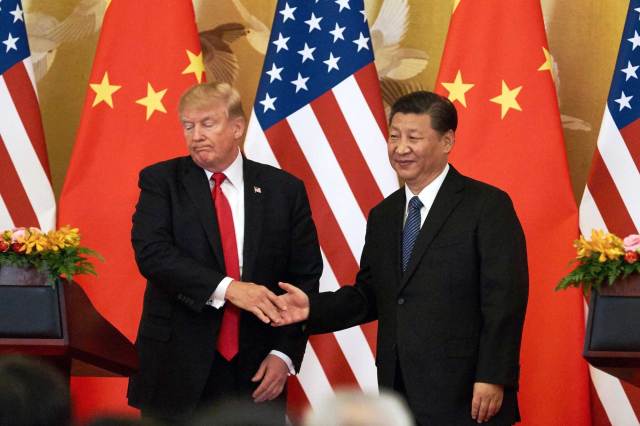Credit: Artyom Ivanov/Tass/PA Images

“Trade wars aren’t so bad,” said President Trump, announcing his steep new import duties on steel and aluminium. Most commentators have been uneasy, however, about his dramatic departure from economic orthodoxy.
A trade war is a conflict between two or more nations by means of reciprocal trade tariffs. The imposition or increase of tariffs is not in itself an act of economic warfare. It is the response of the nation on whose exports the tariffs have been imposed that turns it into a “war”. And, like real shooting wars, the conflict can range from “guerrilla” to general (unlimited) war.
In a real war a nation is fighting for peace – at best, an advantageous peace; at worst, a peace that will avoid the further disadvantages brought on by a continuation of the fighting. War – rational war – is only continued while peace is seen to be a worse alternative. In a trade war, a nation is fighting to protect (for whatever reason) a major sector of its economy. A trade war – a rational trade war – is only continued while “peace” is seen to be a worse alternative, such as the collapse of strategic infrastructure or serious popular unrest.
The theory of beneficial free trade is relatively new. Before the late 18th Century, it was generally held that governments regulated their economies to augment the state’s power at the expense of its enemies; Adam Smith coined the term “Mercantilism” in An Inquiry into the Nature and Causes of the Wealth of Nations (1776).
For example, in the late 18th Century the Royal Navy consumed (by some measures) two-thirds of British government spending. There was a growing empire to protect against physical attack, but the navy’s essential purpose was economic – the protection of trade. Sir Walter Raleigh had spelled it out two centuries earlier:
“For whosoever commands the sea commands the trade; whosoever commands the trade of the world commands the riches of the world, and consequently the world itself.”
From the late 18th Century, Mercantilism was gradually supplanted by the notion of “laissez-faire”, or free trade, as propounded by Smith and, later, David Ricardo[1. David Ricardo’s On the Principles of Political Economy and Taxation (1821) took Adam Smith’s ideas further, arguing that all countries benefit (though not necessarily grow rich) from free trade by producing what they were best at relative to other countries]. The instinct for protectionism remained, though, because the first duty of government is the security of the state, and the economy is the principal source of that security. Since, also, free trade depends on the stability of the geopolitical system, when that stability has been upset – or been threatened – protectionism has returned.

As Britain imposed the Corn Laws, in the United States, the ideas of the German economist Friedrich List (1789-1846) – protecting nascent industry – gained ground[2. In 1827, List published Outlines of American Political Economy, arguing that a national economy in an early stage of industrialisation needed tariff protection. Whatever the costs of the tariff, he argued, it was as an investment in the nation’s future productivity]. They were a factor in the North’s industrial superiority over the Confederacy in the Civil War, for as well as a Ricardian absolute advantage in cotton production (the South’s production costs through slavery were so low that it could sell cotton to Europe cheaper than any competitor), the Confederate states had had a comparative advantage too: no sacrifice in cotton production was worth the gain to be made in industrial output. Protectionism can have short-term advantage, except that the broader price to be paid is difficult to foresee.
This is exemplified by the trade wars between Canada and the United States later in the 19th Century, which caused a steep fall in Canadian exports to America. But Canada then increased its exports to Britain. The US was the loser, and the British Empire the beneficiary. Herein lies the problem of trade wars, indeed, of wars by any adjective: the law of unintended consequences.
Pyrrhic victories
To win a trade war, a country has to be greatly superior economically to its opponent, and any allies an opponent might enlist. A prime example of one country’s “winning” a trade war is that of France in the late 19th century when newly unified Italy imposed steep tariffs on imports in order to spur – in line with List’s theories – domestic industrialisation. France, much richer and stronger, retaliated with tariffs against Italy, and Italian exports to France collapsed. Even when Italy abandoned its tariffs, France retained its high tariffs in punishment. Italy later signed a treaty of mutual assistance with Germany and Austria in case of attack. France would have been far better served in 1914 to have Italy on her side.
The standard theory of international trade holds that although free trade raises incomes generally, there are both winners and losers. When losers are politically powerful, they may convince governments to revert to protection. In the late 19th Century, steamships and railways made possible the hitherto uneconomic shipment of bulk commodities round the world. Faced with a flood of cheap grain from Russia and the New World, governments in France and Germany (and other Continentals) caved in to the protectionist demands of their own farming lobbies and raised tariffs significantly.
Probably the most significant trade war of the 20th century began with America’s Smoot-Hawley Tariff Act (1930) in Herbert Hoover’s presidency, during the Great Depression. The Act imposed steep import duties on some 20,000 goods. Led by Canada, America’s trading partners retaliated with duties on US exports. These fell over 60% until the Act was repealed in 1934. Some historians have argued that the damage done to the world economy fuelled the rise of fascism. It undoubtedly prolonged the Depression.
In an essay for the Centre for Economic Policy Research (CEPR), ‘Lessons from the history of trade and war’ (2008), Kevin O’Rourke, Chichele Professor of Economic History at Oxford, and Ronald Findlay, Professor of Economics at Columbia, argued that the continuation of a broadly liberal international trading environment would require that the geopolitical system adapt to the rise of China and other emerging economic powers. They pointed out that this would mean the end of the “Great Asymmetry” in international economic and political affairs caused by the Industrial Revolution, and that the adjustment would not necessarily be easy. The international system, they suggested, has historically done a poor job of accommodating newcomers to the “Great Power club”. German unification and industrialisation during the late 19th century led to tensions with Britain and France over colonial and armament policy, while Japan’s rise to regional prominence during the interwar period, and its search for secure sources of raw materials, ended in war against United States and its allies.
Both these precedents were worrying, they argued, in that similar questions were being posed today: the rights of emerging nations to rival the established powers’ military capabilities (notably nuclear weapons), and in terms of the strategic importance to countries like China of ready access to oil supplies and other natural resources. Interdependence and trade did not necessarily guarantee peace, they suggested, for it implies vulnerability, and vulnerability can lead to fear, with unpredictable consequences.

The world economy of the late 19th century was extremely interdependent, to the point where the British economist Sir Norman Angell, author of The Great Illusion (1910), famously felt able to pronounce, on the eve of the First World War, that major conflict was now unthinkable. It is one reason why claiming that the EU has kept – and will continue to keep – the peace in Europe these past 60 years is a fallacy. (The guarantor is Nato.)
President Trump may well achieve what he intends with his import tariffs, for his object appears to be limited, probably limited in time too, and he holds some strong cards. Besides, China has been getting its retaliation in first for many years by its dubious acquisition of US intellectual property rights. It may stay its hand with tariff reciprocation.
The law of unintended consequences remains, however.
Further Reading: K.H. O’Rourke and J.G. Williamson, Globalisation and History: The Evolution of a Nineteenth Century Atlantic Economy, MIT Press, 1999.










Join the discussion
Join like minded readers that support our journalism by becoming a paid subscriber
To join the discussion in the comments, become a paid subscriber.
Join like minded readers that support our journalism, read unlimited articles and enjoy other subscriber-only benefits.
Subscribe